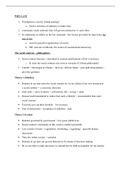Class notes
Topic 1: Lecture notes
- Course
- Introduction To Law 171
- Institution
- Stellenbosch University (SUN)
Topic one lecture notes & textbook summary. Contains information from Ms Johnson's slides which are not my own. This is just an integration of her slides and the textbook.
[Show more]



